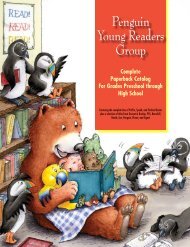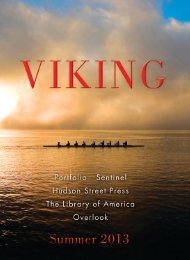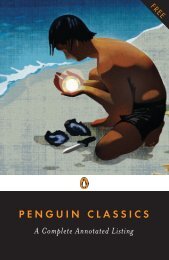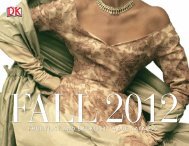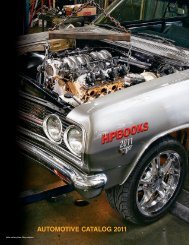Create successful ePaper yourself
Turn your PDF publications into a flip-book with our unique Google optimized e-Paper software.
ACROSS FIVE APRILS<br />
By Irene Hunt<br />
<strong>Copy</strong>right © 1964 by Irene Hunt<br />
CHAPTER ONE<br />
Ellen Creighton and her nine-year-old son, Jethro, were planting potatoes in the half-acre just south of their<br />
cabin that morning in mid-April 1861; they were out in the field as soon as breakfast was over, and southern Illinois at<br />
that hour was pink with sunrise and swelling redbud and clusters of bloom over the apple orchard across the road.<br />
Jethro walked on the warm clods of plowed earth and felt them crumble beneath his feet as he helped his mother carry<br />
the tub of potato cuttings they had prepared the night before.<br />
“It’s damp fur down and warm on top,” he remarked, poking a brown hand deep into the soil. “Once we git<br />
these planted and a soft rain comes, we’ll hev a crop to make people up north call us ‘Egypt’ fer sure.”<br />
He filled a burlap pouch with the potato cuttings and hoisted it expertly to his thin shoulder where a batch of<br />
new freckles was just beginning to appear. The world seemed a good place to him that morning, and he felt ready to<br />
stride down the length of the field with a firm step and a joke on his lips.<br />
“Do you reckon we’ll be through by the time ham and corn bread is ready fer dinner, Mis’ Creighton?” he<br />
asked grinning. He called her “Mis’ Creighton” sometimes as his older brothers did when they teased her; it was just a<br />
step from the too-bold joke of addressing her by her given name.<br />
His mother smiled back at him, acknowledging his mood, but she shook her head at his words.<br />
“Yore hopes is makin’ a fool of yore reason, Jeth. We’re lucky if these ‘taters is bedded by noon tomorrow.”<br />
She made short, quick cuts with her hoe in the mellow soil and waited until Jethro placed a cutting, eye<br />
upward, in the spot hollowed out for it, after which she raked a covering of soil over it and moved down the long furrow.<br />
She was a small, spare woman with large dark eyes and skin as brown and dry as leather. She had been a pretty<br />
girl back in the 1830’s when she married Matthew Creighton, but prettiness was short-lived among country women<br />
of her time; she didn’t think much about it anymore except now and then when Jenny’s fourteen-year-old radiance<br />
was especially compelling. Even if she had been concerned, there were reverberations of Calvinism strong within her,<br />
which would have protested vigorously against the vanity of regret for a passing beauty. She had borne twelve children,<br />
four of whom were dead––perhaps <strong>five</strong>, for the oldest son had not been heard from since he left for the goldfields<br />
of California twelve years before; she had lived through sickness, poverty, and danger for over thirty years; the<br />
sight of a pretty face might bring a tired smile to her lips, but it was a thing of little value in Ellen’s world.<br />
Jethro was her youngest child, born in the year of ‘52, a year in which three of her children died within one<br />
week of the dreaded disease they called child’s paralysis, a disease which struck the country that year, people said,<br />
like the soldiers of Herod. Ellen knew that she favored her youngest son, that she overlooked shortcomings in Jethro<br />
for which her older children had been punished. It was a weakness of her advancing years, she supposed, but this was<br />
the son who had been spared that summer when children all around were dying of the agonizing sickness; it looked as<br />
if, somehow, Destiny had marked him. One didn’t talk about such things; the world, she knew, was impatient with<br />
women who value their own children too highly. Ellen kept her silence, but she saw signs of special talents in Jethro,<br />
and she watched over him with special tenderness.<br />
They worked together for an hour or more without speaking. Ellen was grave and absorbed in the anxious<br />
thoughts of that spring; Jethro was accustomed to adapting himself to the behaviors and moods of older people, and<br />
he found enough in the world about him to occupy his interest as he worked. A south breeze brought the scent of<br />
lilacs and sweet fennel to his nostrils and set all the frosty-green leaves of a silver poplar tree to trembling. There was<br />
a column of wood-smoke feathering up from the kitchen chimney, a sign that Jenny was already making preparations<br />
for a hearty noon meal. From the neighboring field across the creek he could hear the shouted commands to the plow<br />
horses as Matt Creighton and his two older sons got on with the spring plowing. It was a fine morning; many people<br />
around him were troubled, he knew, but that was a part of the adult world which he accepted as a matter of course.<br />
Adults were usually troubled. There were chinch bugs and grasshoppers, months of drought, elections, slavery, secession,<br />
talk of war––the adult world of trouble, though, was not real enough to dim the goodness of an April morning.<br />
At about seven o’clock a team and wagon pulled out of the barnlot, stopping for a minute before turning into<br />
the road while the driver spoke to a girl who came running out of the kitchen door.
Jethro chuckled. “Shad’s leavin’ fer Newton now, I guess. Jenny has to say goodbye like as if he was goin’ to<br />
the North Pole.”<br />
He watched the wagon from the corner of his eye as he worked, and when the team started coming down the<br />
road toward the potato patch, he put the heavy bag of cuttings aside and raced across the field to the roadside. His<br />
mother laid down her hoe and followed slowly, picking her way over the mounds of plowed earth that Jethro’s feet<br />
seemed barely to touch.<br />
The young schoolmaster stopped the team and climbed down from the wagon to stand at the fencerow waiting<br />
for Jethro and Ellen to come up from midfield. He was a tall, powerfully built youth of twenty, with a firm mouth and<br />
grave, dark eyes that gave him the appearance of an older man. He had come out from Pennsylvania three years earlier<br />
to study at McKendree College, where an uncle was professor of natural philosophy, a subject that later generations<br />
would call physics. Faced with insufficient funds to carry on his studies at the end of his first year, young Yale had<br />
turned to the country schools as a stepping-stone toward further work in college, and a series of circumstances had led<br />
him to the school for which Matt Creighton served as a director. Here he had stayed, not just one year as originally<br />
planned, but two, and now in 1861 he had hired himself out as a farmhand to Matt for the summer and contracted to<br />
teach still a third term that fall.<br />
He had been stricken with typhoid fever during his first year of teaching, and Ellen Creighton had patiently<br />
nursed him back to health with the skill she had learned over the years. There was a strong tie of affection between<br />
the two of them; Ellen counted Shadrach as a part of her family and looked after him as she did her own, and<br />
Shadrach Yale, in turn, showed a thoughtful courtesy for her that few women of the prairies received from their own<br />
sons.<br />
“Will you be back by suppertime, Shad?” Jethro called breathlessly as he approached the fencerow.<br />
At school he addressed the young teacher as “Master,” but now that Shadrach was so much a member of the<br />
family the necessary formalities of a schoolroom were forgotten.<br />
“It’s not likely, Jeth, not before nine or maybe later.”<br />
Shadrach smiled at the thin eager face turned up to him. He was mature enough at twenty to appreciate being a<br />
hero to a nine-year-old boy; besides that, Jethro’s quick mind and delight in learning had been a source of pleasure for<br />
studious young Yale, who had known the frustration of trying to penetrate the apathy and unconcern of a backwoods<br />
classroom. He had talked to both parents about the promise he recognized in the boy; Matt, in spite of his pleasure,<br />
had shaken his head and wondered if the praise for Jethro had not stemmed from interest in Jethro’s sister, Jenny. But<br />
Ellen had felt no doubts; the praise was in line with what she herself believed firmly.<br />
She stood beside the gray rails that morning with her hands folded beneath her apron. Matt had made a pretext<br />
of needing supplies from town, but she knew that this trip to Newton in the midst of a late planting season would have<br />
been unthinkable except for the urgency of getting word from the world beyond their own fields and woods pastures.<br />
Her face looked drawn in the bright sunlight.<br />
“I wisht there was a telegraph in Newton, Shad,” she said.<br />
He nodded. “There’s one in Olney; they’ll send any important news on up to Newton as soon as it comes<br />
through. At any rate I’ll bring the latest papers.”<br />
“Seems sometimes there’s a deep silence all about us out here waitin’ to be filled.” She and the young man<br />
looked at one another, each pair of eyes dark with anxiety.<br />
Jethro kicked a stone in the road. “Sure wisht I was goin’ to town with you, Shad,” he said finally, because it<br />
seemed that someone must say something.<br />
“I know. Well, there’ll be other trips this summer, Jeth.”<br />
Shadrach started to climb back into the wagon as he spoke; then, changing his mind, he turned back and<br />
placed his hands quickly on Ellen’s shoulders. “Try not to worry,” he said quietly.<br />
The caress brought sudden tears to her eyes. She and Jethro stood watching as he drove away; when the wagon<br />
disappeared in a clump of trees at a bend in the road, Ellen turned back to her work slowly as if overwhelmed by a<br />
deep weariness.<br />
“The Lord knows what news he’ll bring back,” she said. “There may be war in the land at this minute fer all<br />
we know.”<br />
Jethro was depressed by her somber mood, but not by the imminence of war. He had listened to his brother<br />
Tom and their cousin Eb, the two younger of the grown boys in the household, and their excitement had found its way<br />
into his blood. Dread of war was a womanly weakness, he had discovered, evidenced by his mother’s melancholy and
the tears of Jenny and his brother John’s wife, Nancy.<br />
“I heered some of the big fellers talkin’ the other night, and they said the war, even if it comes, will be no<br />
more than a breakfas’ spell. They said that soldiers up here kin take the South by the britches and make it holler<br />
‘Nough’ quicker than it takes coffee to cool off fer swallerin’.”<br />
Jethro spoke hurriedly, almost sure that the words would anger his mother and vaguely realizing that he wanted<br />
to anger her a little for spoiling the brightness of the morning by her obvious sadness.<br />
She had a way of closing her eyes briefly when exasperated as if to reject for at least a second the existence of<br />
a folly that she was bound to recognize later. Her hoe jabbed deeper and more sharply into the brown earth at her feet.<br />
“They’re foolish young ‘uns, and they’re talkin’ without a spark of reason to guide their words,” she said angrily.<br />
“It ain’t that I don’t love ‘em––big talk or not,” she added, “but I’m fearful of the day when they face their comeuppance.<br />
I’m fearful of the time when I’ll hev no boys left but you––and the three little ones up on Walnut Hill.”<br />
Jethro squirmed inwardly. If there were going to be tears and talk of the children who had died the summer he<br />
was born, he wanted to escape. And since one didn’t easily escape from his mother in the midst of planting a half-acre<br />
of potatoes, he searched hurriedly for a way to turn the conversation.<br />
“Did ever I tell you, Ma, of an old feller that give all the people of the earth their comeuppance?” he asked<br />
brightly, knowing that she was always proud to hear of the things he’d learned from Shadrach at school.<br />
“I reckon you didn’t, Jeth, not that I’m able to recollect.”<br />
Jethro straightened his shoulders a little under the weight upon them.<br />
“Well, ma’am, there was a long time when people allowed that the earth was the big kingpin amongst all the<br />
stars and things. They thought that the moon and sun and all the stars went ‘round the earth and maybe kind of tipped<br />
their hats as they went by. Shad says that most everybody went on believin’ that fer years till finally there come along<br />
this man I’m tellin’ you about. He was head and shoulders smarter than the run of the mill, and after he’d watched the<br />
sun and moon and stars fer a long time he set down and he done some figgerin’. Well, when he got through figgerin’<br />
he showed it to some other fellers and there it was, plain as anything––the earth wasn’t the big kingpin at all. He<br />
allowed it was jest a little old star chasin’‘round the sun with a pack of others, some of ‘em a lot bigger than us. Shad<br />
says that some folks took that news real hard; it kind of let the wind out of their sails all of a sudden.”<br />
“That ain’t in the Scriptures, is it, Jeth?”<br />
“I don’t reckon so, but it’s in one of the books Shad brought out from Philadelphy.”<br />
His mother looked thoughtful. “The Lord God created the earth and all upon it, Jeth. I don’t like to hear that<br />
His work warn’t of the best.”<br />
“But don’t you see, Ma, He created the sun and moon and stars too––some a little bigger, others maybe a little<br />
purtier. Seems like people on earth believed we had the best diggin’s jest because we wanted to believe that––because<br />
it made us feel important––”<br />
“You ain’t watchin’ to keep the ‘tater eyes facin’ up, Jeth,” Ellen said quietly, pointing with the tip of her hoe.<br />
He stooped and turned a cutting over. “Guess I kind of got carried away with my own noise,” he said flushing.<br />
Her eyes lighted a little. “Well, you done me a favor––tellin’ me things I ain’t never learned and givin’ me<br />
somethin’ to ponder over. It ‘mazes me, Jeth, it does fer a fact, the way you kin recollect all the things Shad tells you<br />
and how you kin put them from his way of talkin’ into mine.”<br />
She hoed in silence for a minute and then paid him the great compliment of going back to his story.<br />
“Did you tell me what the old feller’s name was, the one that done all the figgerin’?”<br />
“His name was Copernicus. I kin even spell it fer you if you’re a mind. Shad made me learn how to say it and<br />
spell it too.”<br />
“Sounds like a furriner.”<br />
Jethro nodded. “I allow,” he agreed.<br />
Ellen sighed. “Seems like furriners is allus stirrin’ up somethin’. Well, the pot can’t call the kettle black––look<br />
what we’re stirrin’ up amongst ourselves.”<br />
She was back to the problems of the times, and Jethro knew that he could not tempt her away from them. For<br />
months he had moved along the edge of the furor that raged among the adults of his family, of the neighborhood, and<br />
even of the church. He knew that there had been fights in the neighborhood, anger and triumph over the election of<br />
President Lincoln in the fall of ‘60, but he supposed, if he thought of it at all, that this was the natural behavior of<br />
people interested in a vague thing called politics. He had heard talk of tariffs, of slave states and free ones, of a violent<br />
old man named John Brown, and during the past winter, of states seceding from the Union. But it had just been
talk to him, and the only part of all the talk that held any interest for him was the conviction among all the men that<br />
war was sure to break out sooner or later. It hadn’t broken out yet, however, and some men were swearing because the<br />
President had not declared war, while others were saying, ``Jest let Ol’ Abe fire on the South and watch Kentucky,<br />
Missouri, Tennessee––yes, and maybe southern Illinois––tumble over on the Confederate side of the fence.”<br />
He knew a little about wars. The Revolution, of course. The American Revolution, Shadrach had pointed out,<br />
and Jethro had been amazed that there was ever any other. He liked stories of wars. There was a beautiful one<br />
described in one of Shad’s books in which an ancient king watched ships fight in a place called Salamis Bay; there<br />
was another exciting story of a battle in which small, fast ships with the lucky help of a violent storm had played Old<br />
Ned with a proud and mighty navy. He wanted to tell his mother about that one, how if the battle had gone the other<br />
way, both Ellen and Jethro Creighton might well have been speaking Spanish as they planted their potatoes that April<br />
morning.<br />
She wouldn’t have liked that though; she was suspicious of people who spoke a different language. Well, one<br />
learned when to speak and when to keep one’s tongue between his teeth. Jethro was not going to talk to his mother<br />
too much of either languages or wars, but he knew that, as far as the latter were concerned, he was one with young<br />
Tom and Eb when they hoped that war would come soon. War meant loud brass music and shining horses ridden by<br />
men wearing uniforms finer than any suit in the stores at Newton; it meant men riding like kings, looking neither to<br />
the right nor the left, while lesser men in perfect lines strode along with guns across their shoulders, their heads held<br />
high like horses with short reins. When the battle thundered and exploded on all sides––well, some men were killed,<br />
of course, but the stories of war that Jethro remembered were about the men who had managed to live through the<br />
thunder and explosion. Matt Creighton’s grandfather had lived through the Revolution; Matt himself had survived the<br />
Mexican War; and Uncle Billy Jeffers, down the road, was still alive to tell tales of the War of 1812. Jethro, forgetting<br />
the lecture to his mother on the inclination of people to select beliefs that bring them most satisfaction, never doubted<br />
that if Tom and Eb got their chance to go to war, they’d be back home when it was over, and that it would be shadowy<br />
men from distant parts who would die for the pages of future history books.<br />
Death, however, was neither simple nor lightly brushed aside when it struck home. Jethro frowned; he didn’t<br />
like to think of his sister Mary’s death, but some memory had been touched off as his thoughts wandered. Let a few<br />
hours of work go by and let one’s body begin to weary a little––then the thoughts that had been all of beauty and<br />
spring a while before started turning to things that were better forgotten. He had not forgotten though; he’d been only<br />
seven that winter of ‘59, but the memory of the tragedy would always be sharp and terrible in his mind.<br />
Mary had been as pretty as Jenny, only blond and more delicate. Jethro remembered that it was a bitter night<br />
and that he had stood with his nose pressed against the cold windowpane watching Rob Nelson help her into the<br />
wagon before they left for a dance over toward Hidalgo. What happened later he’d pieced together from loud outcries<br />
and scraps of conversation deep in the middle of the night.<br />
It seemed that a crowd of young toughs from the south of the county had broken uninvited into the dance,<br />
waving whiskey bottles and shouting drunken insults at the guests. As things began to look more and more dangerous,<br />
Rob found Mary’s wraps, and they were starting for home when a drunken youth named Travis Burdow saw them<br />
leave and followed them on horseback.<br />
Rob told Matt Creighton how he had urged the team, hoping to get to Ed Turner’s farm where he could get<br />
help, because he knew that Burdow was armed. Rob had succeeded in getting as far as Turner’s driveway when<br />
Burdow, seeing that his game was about finished, rode up beside Rob’s team and fired a pistol over the heads of the<br />
horses. The frightened animals bolted through a rail fence, overturning the wagon and kicking themselves loose from<br />
the tongue. Mary was dead when Rob and Ed Turner pulled her from the wreckage.<br />
The countryside was in an uproar the next day when news of the tragedy got around. Matthew Creighton was<br />
held in high esteem by his neighbors, and the senseless killing of his daughter stirred up a rage that was heightened by<br />
the fact that the whole Burdow family was commonly despised throughout the countryside as a shiftless lot with a bad<br />
background.<br />
The grandfather of Travis Burdow had come from somewhere farther downstate, and when he moved into<br />
Jasper County he came hurriedly, in order, so the story went, to escape a mob of citizens whose anger during years of<br />
petty thieving had exploded over the theft of a team of horses from a prosperous farmer. Whether the story was true or<br />
not, suspicion and dislike settled upon the family, and thirty years had failed to dissipate it. The Burdow children were<br />
nicknamed “Jail Burd-ows” by taunting schoolmates and persecuted in a hundred petty ways. Dave Burdow, father of<br />
young Travis and son of the alleged horse thief, was a sullen, silent man who shunned people in general and accepted
their insults as a matter of course when he was forced to deal with them. His sons, for the most part, were much like<br />
him except when liquor quickened their courage and defiance. The shot that Travis Burdow fired over Rob Nelson’s<br />
team that night was a shot fired at a society that had kicked a boy from childhood on because he bore his grandfather’s<br />
name.<br />
And so the anger of the mob at Mary’s death was doubled and tripled because a Burdow was responsible. By<br />
late afternoon, a crowd of fifty or more armed men stopped at the Creighton cabin to tell Matt of their intention of<br />
hunting Travis Burdow down and hanging him on the spot. But Matt Creighton had intervened, and it was a mark of<br />
the respect he commanded in the community that the men listened as he stood for an hour in the icy afternoon pleading<br />
with them to keep their hands free of further bloodshed.<br />
Jethro, understanding the situation more fully now that he was older, wondered at his father’s intervention that<br />
afternoon. His own sympathies, even on a spring morning eighteen months later, were with the angry men as they prepared<br />
for the manhunt. He wondered. He had great confidence in his father, but his sense of justice was hard put to<br />
accept the fact that Travis Burdow had been allowed to escape the consequences of his drunken crime. It occurred to<br />
him that he felt the same way toward his father as he did toward Abraham Lincoln––why should the President waver<br />
so long? Why should he refuse, week after week, to start the great explosion which the young men wanted to get started<br />
and have finished before the year was well into the summer? Jethro had to admit to himself an uncomfortable feeling<br />
of anger for both the President and his father; they had not shown the hard, unyielding attitude that he admired in<br />
the talk of Tom and Eb and their friends.<br />
He sighed suddenly and deeply at his perplexities. Ellen noticed the sigh and glanced at him quickly.<br />
“Be you spent, Jethro?”<br />
He shook his head. “No, I’m doin tol’able. I was jest thinkin’ about things.”<br />
“What kind of things, Son?”<br />
“Fer one thing I was wonderin’ why Abe Lincoln can’t make up his mind about war. I wonder––is he like Pa?<br />
Is he so aginst hevin’ blood on people’s hands that he’s afeared to start a war?”<br />
Ellen stopped her work and stood for a moment without speaking, her rough brown hands resting on the handle<br />
of the hoe.<br />
“He’s like a man standin’ where two roads meet, Jeth,” she said finally, “and one road is as dark and fearsome<br />
as the other; there ain’t a choice between the two, and yet a choice has to be made.” She shook her head. “May the<br />
Lord help him,” she whispered. “May the Lord guide his hand.”<br />
The sounds of morning were all around them as they stood silently in the middle of the furrow. From the fields<br />
across the creek came the monotonous shout to the field horses; up at the house Jenny’s voice came clearly, pleasant<br />
as the sound of a little bell ringing.<br />
“Here chick,” she called, “here chick, chick, chick, chick, chick, chick––”<br />
Ellen slowly reached out with her hoe and broke a clod of dirt into crumbling fragments.<br />
“Well, we got plantin’ to do, Jeth,” she said at last, and they went on with their work.<br />
When the sun was directly above their heads, Ellen leaned her hoe against the fence, and she and the boy<br />
trudged slowly up along the fencerow toward the house. Hunger pangs twisted Jethro’s insides, and he was tired, but<br />
the prospect of dinner and an hour of cool rest under the trees in the dooryard cheered him to the point where he<br />
could whistle a little and make lazy gestures of play with the shepherd dog that came bounding down the path to greet<br />
him.<br />
The cabin they approached was small and squat, built of logs and entirely plain, a typical pioneer’s cabin. Its<br />
basic ugliness was softened by a thick growth of vines clambering over the walls and roof and by a general air of<br />
neatness and pleasant dignity in the dooryard, the hedgerow of lilacs, and the prim, green rows of vegetables in the<br />
garden. Two rooms of the cabin faced west, both opening onto an uncovered porch where a half dozen split-bottomed<br />
chairs were ranged for the comfort of those who wished to rest and get a breath of air after meals, or to sit in the coolness<br />
of a spring night and watch the shadows move in over the prairies. Behind these rooms a kitchen extended the<br />
width of the house, with doors at either end opening onto the dooryard. Here huge silver poplars towered above the<br />
cabin, their roots extending like giant claws, making the ground rough and robbing it of grass. A low picket fence covered<br />
with a tangle of sweet honeysuckle stretched along the front of the yard; beyond this fence were the hitching<br />
posts in an area covered by sweet clover and an acrid-smelling little flower that Jethro knew as “dog fennel.”<br />
The road in front of the house ran due north through that line where the last glacier had melted in some distant
age and left its final load of drift, a line that separated the rich, black loam culture of northern Illinois from the poor,<br />
hard-packed clay culture to the south.<br />
Jethro regretted the melting of that glacier; if it could have hung on another hundred miles, life might have<br />
been very different for him and his family. But then it hadn’t, and anyway he loved the dog fennel and the silver<br />
poplars and the hedge of lilacs on the south that separated Jenny’s well-drained kitchen garden from the dooryard. He<br />
doubted that there were such wooded hills or winding creeks in the cornbelt of the north as one could find by the<br />
dozens in the clay lands, and he could not imagine contentment in any spot other than this one, which his father had<br />
chosen thirty years before. But it was a pity about the glacier. Only another hundred miles!<br />
Jenny had poured fresh water into a big basin so that her mother and Jethro could cool their faces and wash the<br />
dirt and grime from their hands.<br />
“Nancy and the little tykes are here,” she called to Ellen. “We got a nice meal fixed fer you.”<br />
Jenny had swept her shining black hair high upon her head because of the heat in the kitchen where the food<br />
was prepared over an open fireplace, and little drops of sweat stood out under her eyes and over a very firm chin. She<br />
grinned at Jethro and whacked him briskly on the seat as he came up to the kitchen well.<br />
“I’ve got a crock of lettuce fer you, Jeth, though I’m terr’ble wasteful in pickin’ it too young. But I know how<br />
you been dreamin’ green things as fur back as last December. Nancy and I allowed maybe yore body had need of<br />
spring eatin’.”<br />
Green food. The hunger pangs grew even sharper at her words. His body did, indeed, have need of green food,<br />
if a continuous hunger for it meant that a need existed. He had felt many times during the long winter that he would<br />
have gladly exchanged all the pork in the smokehouse and all the gallons of sorghum, which he had helped to boil<br />
down, for one big crock of salad greens. He smiled at her, and Jenny understood his gratitude. It was as much as she<br />
expected; the Creighton males did not go into long speeches about such matters.<br />
John’s wife looked up from her work and smiled shyly at Jethro and her mother-in-law when they entered the<br />
kitchen.<br />
“I invited myself up fer the day, Mis’ Creighton,” she said in her thin voice. The name “Mis’ Creighton” was<br />
not a joke when Nancy used it; there was a reserve about the thin, quiet girl John had brought back from Kansas four<br />
years before that kept her almost a stranger to her husband’s family. She was amiable but aloof to the friendly<br />
Creightons, except for an occasional gesture of fondness for Jenny and for John’s favorite brother, Bill. John defended<br />
his wife earnestly to his mother.<br />
“She was brought up by relations that treated her harsh. To draw back and say nothin’ is her way of protectin’<br />
herself. You must be patient with her, Ma, like one of yore own––”<br />
Ellen had had long schooling in patience. Now as she answered Nancy’s greeting her voice was very quiet.<br />
“You never need ary invitation to John’s home, Nancy. It’s yorn, too, and you’ll hev welcome any day.”<br />
She seated herself beside the door and took the youngest child in her lap. Nancy went on with her work, not<br />
sullenly, but so withdrawn that Ellen wearily gave up trying to talk with her and directed all her attention to the small<br />
boy.<br />
The men came in from the fields soon. Jethro, because he was now a field worker, was allowed to eat at the<br />
first table with his parents and elder brothers. It was a coveted honor and he accepted it with dignity, looking somewhat<br />
like a solemn dwarf as he sat between his father and Bill, his eyes wide beneath the tumble of yellow curls that<br />
clung to his forehead and the back of his neck.<br />
<strong>Across</strong> from him were the eighteen-year-olds. Tom was a mild-faced lad who, like Jethro and Bill, had inherited<br />
the blond hair and blue eyes of his father’s side of the family. Eb Carron, a nephew of Matt’s, had lived with the<br />
Creightons since he had been orphaned in childhood. Jethro admired the two big boys, but he sensed their indifference<br />
toward him and kept his distance generally. He was not especially hurt by their attitude; the youngest in the family<br />
knew his place. Besides, Jenny and Bill made up for any neglect on the part of the big boys a hundred times or more.<br />
Bill, his favorite, was a big, silent man who was considered “peculiar” in the neighborhood. In an environment<br />
where reading was not regarded highly there was something suspect about a young man who not only cared very little<br />
for hunting or wrestling and nothing at all for drinking and rampaging about the country, but who read every book he<br />
could lay his hands upon as if he prized a printed page more than the people around him. He wasn’t quite held in contempt,<br />
for he had great physical strength and was a hard worker, two attributes admired by the people around him; but<br />
he was odd, and there was no doubt of that. Men had seen him stop his team in midfield to watch the flight of a line<br />
of birds, and a story went the rounds of Bill talking to his horse as if it were a person. “He talked to it gentle,” the
story went, “like a woman talkin’ to a young ‘un.” He had even attended school the previous winter when work was<br />
slack, which was surely a fool thing to do unless one was interested in “breakin’ up school.” He had listened intently<br />
to what a young man three years his junior had to say; he had studied and done the tasks set for him by Shadrach Yale<br />
as if he were no older than Jethro. It was not a behavior pattern of which the backwoods community approved; a lot of<br />
people smirked a little when they mentioned Bill Creighton.<br />
Jethro loved Bill far and away beyond his other brothers; his mother understood why. “He’d put his hand in the<br />
fire fer you, Jeth,” she told him once, and Jethro believed her.<br />
John, the oldest of the children left at the home place, sat at the end of the table facing his mother. He was<br />
dark like Ellen and more slender and wiry than Bill. These two brothers were very close to one another, a fact which<br />
had always been a matter of pride to Ellen, who strove to make family ties firm and secure. John was more impatient,<br />
quicker to anger than Bill, but the two of them had sought each other’s companionship from childhood; there seemed<br />
to be a bond of understanding between them that had developed with the years. John’s oldest son was named for this<br />
brother, and Nancy, whose aloofness toward Ellen and Matt never once gave way in the face of all their efforts,<br />
addressed John’s favorite as “Brother Bill.”<br />
Jethro neither liked nor disliked John. Perhaps because of Nancy’s shyness, which he interpreted as unfriendliness,<br />
the boy extended his feeling of uneasiness with her to John and the two children. He seldom went near his<br />
brother’s cabin, which was only a half-mile away, and he made no move to attract or amuse the children.<br />
Jenny moved quickly and a little breathlessly from fireplace to table, carrying dishes of meat and roasted potatoes,<br />
pitchers of milk, and great mounds of corn bread squares, still powdered with the wood ashes in which they had<br />
been baked. She was red-cheeked with pride over her efforts at providing a good dinner, and her eyes flashed a little<br />
in the direction of Tom and Eb, from whom she anticipated the usual teasing. Jethro smiled at her when she brought<br />
on the huge crock of lettuce, and Jenny saw to it that he received a generous serving before she passed it around the<br />
table.<br />
Nancy poured steaming coffee into big mugs, and Jenny placed one beside the plate of each adult at the table.<br />
Children might have priority to a pudding or the last piece of cake, but coffee was an adult luxury, which<br />
Jethro enjoyed but dismissed with a passive acceptance of family custom that he never thought to question. On this<br />
day of the boy’s graduation to “first table” honors, however, Bill took a dried crust of bread––the remains of a rarely<br />
served “white loaf”––and after soaking it in his coffee cup for a few seconds, spread it with butter and placed it on his<br />
brother’s plate. Jethro nodded his thanks briefly; he did not wish to attract the attention of the others at the table to the<br />
favor.<br />
“This meal is right good, Jenny,” John remarked pleasantly. “You air a fair cook fer yore years.”<br />
“We might ha’ had cake and fixin’s though, if Shad had been eatin’ with us,” Tom said, grinning at his sister,<br />
who could hardly hold back the pleased smile that mention of the young schoolmaster elicited.<br />
“Can’t help but feel a mite sorry fer pore Shad,” Eb added solemnly. “Jenny’s been feedin’ him so nice lately,<br />
he won’t be able to say ‘No’ comes a leap year.”<br />
“Jenny is fur and away too young to be thinkin’ about Shad or ary other young man,” her father remarked quietly.<br />
Jenny looked to the ceiling for an exasperated second as she stood behind her father’s chair. She was only<br />
fourteen, it was true, but she was as tall as Nancy and within two years as old as Ellen had been when she married<br />
Matthew Creighton. It was also true that she had her eye on Shadrach Yale, and all had been going well, too, until<br />
recently when, after a private talk with her father, the young schoolmaster had taken on a solemn and paternal attitude<br />
toward her, which Jenny found intensely annoying and unsatisfactory.<br />
“Wonder when Shad allows to git back?” John asked after a guarded smile had been shared by the young people.<br />
“By nine, or thereabouts, he thought,” Ellen answered. “I hope we won’t be too fur spent to wait up fer him.”<br />
“I won’t,” John said. ``I want to see them city newspapers––” he stopped as he saw Nancy’s anxious eyes on<br />
his face. He had tried to avoid talk of war as much as possible lately; the two younger boys were too eager for it, the<br />
womenfolk too ready to cry about it. And Bill, for the first time that John could remember, had reservations about a<br />
subject and seemed unwilling to discuss it with his brother.<br />
They ate in silence after that, but there was tension in the air. Jethro, although he was concerned mostly with<br />
the goodness of the food he ate, was vaguely aware of a troubled preoccupation all about him.<br />
He and his mother went back to the fields after they had rested for an hour or so. The afternoon was hot, and
the new freckles across Jethro’s shoulders were nearly lost by mid-afternoon beneath the red burn that spread over<br />
them. Ellen untied her apron and folded it across the back of his neck; that helped a little until the thongs of the potato<br />
pouch rubbed a blister on the sunburned skin, after which sweat and insects joined forces to torment him. The buoyancy<br />
of spirit and the beauty of early morning had long since given away to discomfort and the boredom of monotony.<br />
By sundown, both Ellen and Jethro dragged down the length of the field with weariness lining their faces and tugging<br />
at their bodies.<br />
“Seems like a lot of ‘taters, Mis’ Creighton,” Jethro said finally. He tried to smile, but the dark circles around<br />
his eyes were more convincing than his smile.<br />
At the end of the furrow, Ellen sat down on the grass near the rail fence and reached a hand out to the boy.<br />
“We’ll set a minute, Jeth. Sunup to sundown is a long time fer either boy or woman. The plantin’ won’t suffer<br />
overmuch if we spell ourselves a little.”<br />
He was grateful for the rest, and, clasping his knees, he let his head fall forward, while comfort poured all<br />
through him with the relaxation of his body. He teased an ant that tried to run across a stick at his feet, blocking its<br />
way with the big toe of one foot and then the other, chuckling a little at his own mischief.<br />
Shadows were beginning to grow long among the trees on Walnut Hill and down along the creek where the<br />
dogwood branches stood out whiter and more like ghostly clouds with the background of misty purple thickening<br />
behind them. Jethro let the ant go on its way, and sat staring at the shadows with the lonely ache that beauty sometimes<br />
brought to him. He turned once to speak to his mother, but she sat silently, her large eyes closed as she rested<br />
her head against one of the gray rails, so he said nothing, glad to prolong their rest for as long as possible.<br />
They had sat so for ten minutes or more when the sound of wheels far down the road attracted their attention.<br />
Ellen rose stiffly and leaned against the rails; Jethro stood beside her.<br />
“It’s too early fer Shad to be gittin’ back from Newton,” Ellen said, rubbing her eyes. “Kin you make out<br />
whose team it is, Jeth?”<br />
“Not anybody from right around here,” he answered. “Sure is a fine, high-steppin’ team though.”<br />
They watched curiously as the wagon approached, the team obviously being checked as the driver saw Ellen<br />
and Jethro beside the fence. Then, as the wagon came to a stop beside them, a young man rose from the seat and<br />
swept off his hat.<br />
“Ain’t you folks up here in Illinois a mite behind with yore crops this year, Aunt Ellen?” he called, his voice<br />
suggesting laughter.<br />
Ellen’s face broke into a wide smile of recognition.<br />
“Well, in the name of all that’s good––Wilse Graham, whatever brings you up from Kaintuck at this time of<br />
year?”<br />
She climbed over the low rails and held out her arms to the young man, who had jumped down from the<br />
wagon.<br />
“I had some dealin’s in these parts, Aunt Ellen; I figured it was worth an extry day of drivin’ to see all of you.<br />
Think you kin put me and my team up fer the night?”<br />
Jethro could see the pleasure in his mother’s face. This Cousin Wilse Graham was her sister’s son; his visit<br />
would mean news of the Kentucky country where Ellen had been born, and of the relatives from whom she so seldom<br />
heard. As for Jethro, delight ran up his spine. He didn’t know Wilse Graham, but the man was “comp’ny”; that meant<br />
enough to set this day apart from the monotonous routine of many others.




